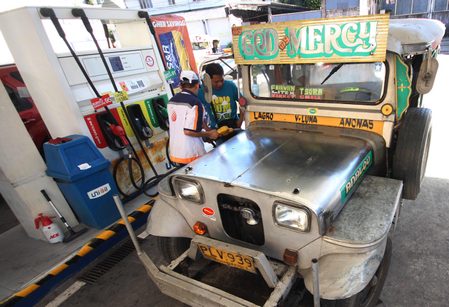SUMMARY
This is AI generated summarization, which may have errors. For context, always refer to the full article.
![[OPINION] Wanted: A just transition for the jeepney sector amid the climate crisis](https://www.rappler.com/tachyon/2023/03/Wanted-A-just-transition-for-the-jeepney-sector-1.jpg)
The impending weeklong jeepney strike on March 6 to 12 has resurfaced the heated and spirited debate on the Public Utility Vehicle Modernization Program (PUVMP) and the issues that come with it. Among these issues are the lack of available financial support and safety nets for jeepney modernization and the decreased accessibility of public transport caused by the consolidation of franchises and fleet management.
While the program started in 2017 under the Duterte administration, the COVID-19 pandemic had postponed this government’s push for its implementation.
Now, the PUVMP is apparently gaining traction under the present administration. The government has recently enacted the Electric Vehicle Industry Development Act or EVIDA. Private sector investment and interest have signaled the viability of electric vehicles in the Philippines, not only for private but also for public transportation. Electric mobility has been taking space in the development agenda of international organizations and international financial institutions.
Government policy and private sector outlooks, and even the international agenda, have adapted. However, small-scale operators, drivers, and those dependent on the traditional jeepney industry (whether manufacturing, assembly, maintenance, and other related support services) have obviously not (owing to the heavy losses from the pandemic and high fuel prices in the past year), and will continue to be left behind should the PUVMP be implemented in its current form.
Electric vehicles and the climate
The transport sector remains to be one of the fastest growing greenhouse gas-emitting sectors. With the increasing demand for vehicles in the post-COVID world, especially in low-income and developing countries, and without any vehicle demand reduction through public transportation reform or a shift to more sustainable vehicle options, the reliance of the transport sector on fossil fuel and non-renewable energy sources is alarming globally.
From the point of view of climate change mitigation, carbon emissions must be minimized, if not net-zero, in order to prevent irreversible global warming that leads to extreme climate and slow onset events. According to the United Nations Environment Program, “[t]o achieve a cleaner transport sector, a combination of measures needs to be implemented world-wide: better-designed cities; safe and comfortable walking and cycling facilities; more public transport; and cleaner and more efficient on-road fleets, including electric vehicles.”
One of the ways to achieve this is through the shift to electric mobility. While there are demand generation strategies and incentives to increase electric vehicle market for Philippine households and consumers, in the Philippine public transport parlance, it is what we know as jeepney modernization or PUVMP. However, it begs the question, does climate action really have to be at odds with the livelihood and economic security of those affected by the shift?
Just transition in jeepney modernization
In climate change policy and action, the concept of just transition directly tackles the question posed above. Just transition, briefly put, refers to the following concern. In the shift from a largely fossil fuel-dependent society to a sustainable society with ready access to renewable energy sources and technologies, workers and frontline communities who depend on fossil fuel-dependent industries must not inequitably carry the burden and costs of such shift.
Otherwise stated, just transition asks, how must the costs of the shift to a sustainable society be equitably shared across stakeholders?
Recognizing that climate action must indeed be shared by all and carried by all, although differently, everyone — from governments, to business enterprises, to private citizens — has to make a sacrifice to realize a sustainable society.
However, that burden must not only be shared. It must be equitably shared.
Just transition and the equitable sharing tied to the former are viewed differently as well.
For instance, the Just Transition Research Collaborative, a global consortium of researchers studying the concept of just transition and how it can be better developed for climate change policy, recognizes that just transition may have different meanings.
For some, just transition is satisfied by merely transitioning to a green(er) economy while retaining affected workers, but without institutional changes that address local and global inequities. As applied to the proposed PUVMP, this may refer to the mere change or transition of traditional jeepneys to electric jeepneys, without addressing the wider and more complex issues of the transport and urban planning sectors.
For others, just transition is met only when distributive and procedural justice are considered in the shift to a sustainable society, which means that existing inequities, discrimination, and lack of access to opportunities across stakeholders are simultaneously targeted and addressed as well – not only the “greening” per se. Consequently, as applied to the proposed PUVMP, it begs the question of whether the program has mechanisms to safeguard the interests of jeepney operators – the small and medium ones, especially – and the drivers, and of whether the program is partnered with a public transportation reform that increases its accessibility to commuters.
This is how we should assess and influence the PUVMP. All of these are to ensure that just transition is established, and further, that such just transition is what can truly, equitably share the costs among stakeholders.
A sneak peek into climate action
The global community is on the same page that climate action must be done at the soonest possible time. Although there are differences on the desired timeline for when fossil fuel energy sources and technologies must be phased out, there is a common understanding that at one point, we must all shift to a sustainable society. The problem, however, is we cannot consume all the time that we need, because irreversible global warming has a tight deadline.
The matter of just transition, when viewed incorrectly, may be perceived as delaying any positive action that governments and non-state actors are doing. Some may think that the matter of equitable sharing of costs among stakeholders is not at all essential in shifting away from fossil fuels. However, just transition must not be viewed as something optional or merely supplementary. Instead, it must be considered as part and parcel of whatever kind of shift to a sustainable society the world wants to achieve.
While we recognize that global climate action must be done immediately, it should not be railroaded at the expense – again – of the marginalized and most vulnerable of society.
In the context of the PUVMP, although the government has announced last March 1 the extension for the phaseout of traditional jeepneys, the program apparently is still bound to happen, if the present bureaucrats running the transport sector are to be believed — definitely not by June 2023, but by December 2023, or if postponed again, at an indefinite later time.
Indeed, the matter of just transition should not be a reason to delay the PUVMP. On the contrary, just transition should be at the core of the PUVMP. Just transition not only ensures that that we, as a country, are taking the first step correctly toward a sustainable future, but also in the long term ensures a public transport program that is socially just, democratic, and public service-oriented.
We must hold the line and ensure that there is accountability from the government in designing and implementing the modernization program. It might not yet occur to us at this point, but whatever outcome this program has shall set the precedent for future government efforts “in the name of sustainability and climate action.” If we let injustice prevail in the name of sustainability, then have we really taken a step toward a sustainable future?
The authors are all strong advocates of addressing climate change. We are also champions of climate justice.
Just transition must be placed at the core of any sustainability effort. If disregarded, we are in danger of rebuilding a “new society” that, although “green,” is not any less inequitable for our people. – Rappler.com
Tony La Viña teaches law and is Associate Director for climate policy in the Manila Observatory.
Kaloi Zarate, a public transport sector policy reform advocate, is a former three-term member of the House of Representatives, and Deputy Minority Leader, of the 18thCongress.
Jayvy Gamboa is a policy and legal research associate at the Manila Observatory with a research interest on just transition, particularly on labor law and regulation.
Add a comment
How does this make you feel?


There are no comments yet. Add your comment to start the conversation.